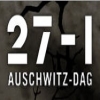What did the Second World War to do with the conflict between Israel and Palestine today? How do understandings of the past used to interpret the present time? And why do we remember some tragedies and forget others? It is Auschwitz today.
How is it ensured that 20th century genocide is not forgotten? And most importantly, that they will never be repeated? Auschwitz-day today focuses on genocide, and education sites across the country participate when Auschwitz Day this year is dedicated to the memories and stories about genocide.



